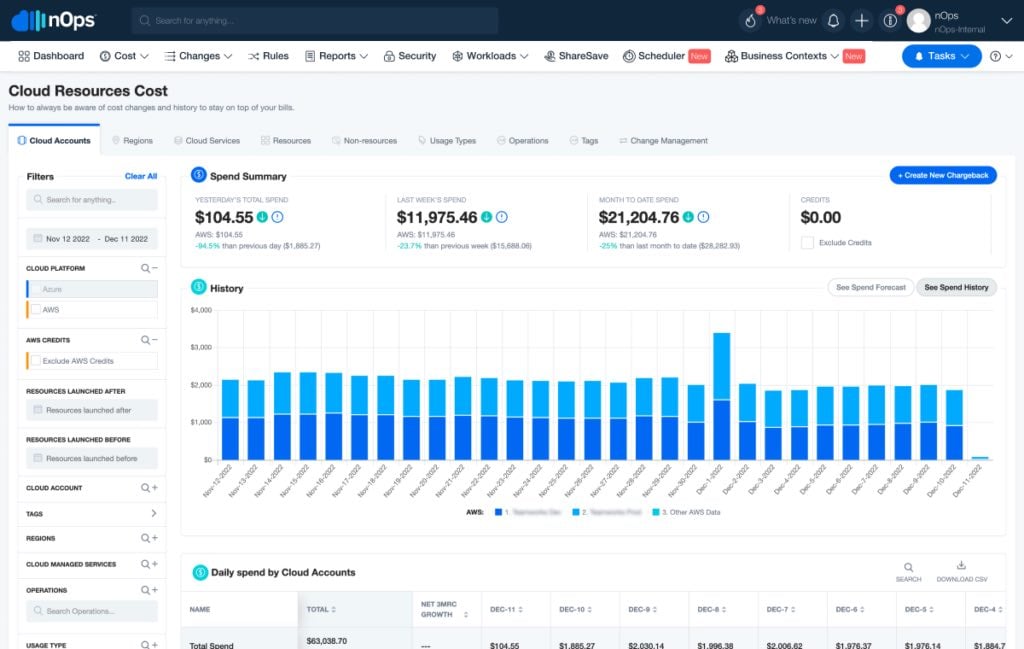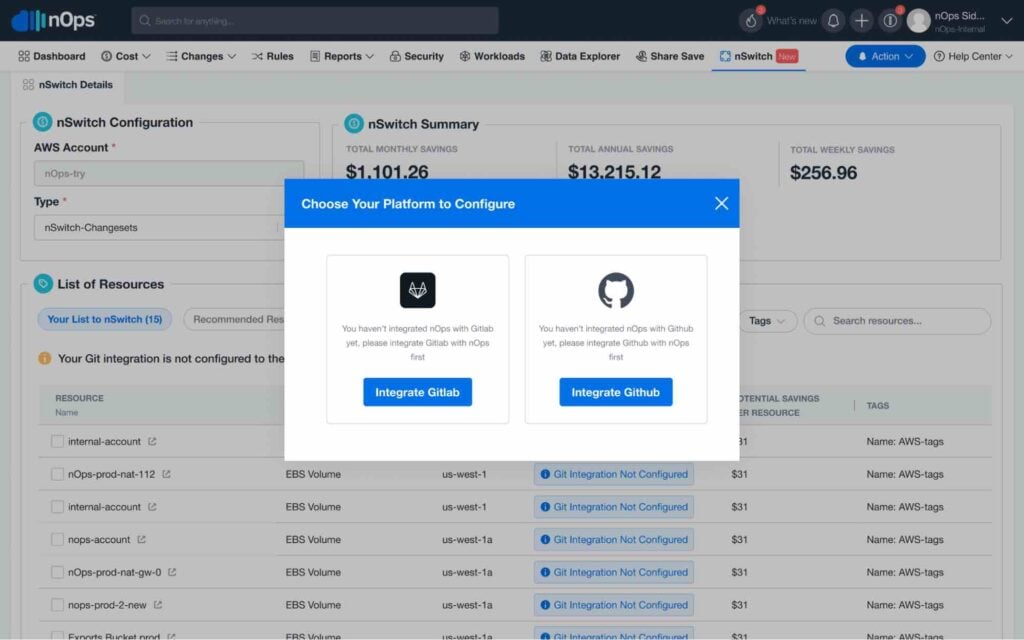rm worth your time and investment. In this review, I'll dissect the ins and outs of the nOps Cloud Management Platform to give you all the information you need. By the end, you'll have a clear understanding of whether this platform fits your enterprise needs.

nOps Cloud Management Platform Overview
nOps serves as a cloud management platform specifically designed for AWS (Amazon Web Services). Targeting enterprises, IT teams, and DevOps, it aids in optimizing AWS costs and managing change.
The platform brings considerable benefits, such as cost savings and simplified change management, addressing pain points like spiraling cloud costs and inefficient workloads. Noteworthy features include its Well-Architected Framework Review (WAFR), auto-scaling, and automation capabilities.
Pros
- Cost Optimization: nOps excels in AWS cost optimization, which allows for efficient use of cloud resources.
- Automation: The tool automates numerous tasks, from provisioning to remediation, facilitating more efficient workflow management.
- Well-Architected Framework: The platform provides a comprehensive Well-Architected Framework Review (WAFR), aiding in foundational technical reviews and cloud security assessments.
Cons
- Learning Curve: nOps can be less user-friendly compared to some of its competitors, posing a challenge for those new to cloud management tools.
- Limited Integrations: While robust in its AWS capabilities, nOps offers fewer integrations with non-AWS cloud infrastructure.
- Customer Support: Some users have reported that customer support could be more responsive, especially when dealing with complex AWS accounts.
Expert Opinion
Judging by its feature set, nOps does several things quite well, especially in the realms of cost optimization and automation. The platform's focus on AWS makes it a particularly strong candidate for enterprises heavily invested in Amazon's cloud services. However, the limited range of integrations and a somewhat steep learning curve can be drawbacks for some users. In terms of pricing, it provides value for money, particularly if AWS cost savings are a priority.
On the downside, customer support might require some improvement to match the overall experience offered by other cloud management platforms. For those deeply integrated into AWS and looking for a specialized tool to manage and optimize their cloud resources, nOps is a strong contender.
nOps: The Bottom Line
nOps stands out for its Well-Architected Framework Review and AWS-specific features, such as specialized AWS cost optimization and auto-scaling. Its automation capabilities also simplify provisioning and other IT services, making it a robust tool for those heavily invested in AWS. It offers features like WAFR and AWS-specific cost savings that you won't find readily available in many nOps alternatives.
nOps Deep Dive
In this section, we'll navigate the intricate layers of nOps' AWS cloud management capabilities. Drawing from my decades-long experience in cloud management tech, I'll unpack the software's key features, functionalities, and unique offerings.
Product Specifications
- Cost Management - Yes
- Resource Optimization - Yes
- Automation - Yes
- Self-service Provisioning - Yes
- Security Compliance - Yes
- Performance Monitoring - Yes
- Multi-Cloud Support - No
- User Access Control - Yes
- Reporting and Analytics - Yes
- Billing and Chargeback - Yes
- Change Management - Yes
- Governance - Yes
- Backup and Disaster Recovery - Yes
- Template Management - Yes
- Role-Based Access Control - Yes
- Workload Migration - No
- Service Catalog - Yes
- Network Management - Yes
- Storage Management - Yes
- Logging and Auditing - Yes
- SaaS Integration - No
- API Access - Yes
- Extensibility - Yes
- Capacity Planning - Yes
- Incident Management - Yes
Feature Overview
- Cost Management: nOps excels at AWS cost optimization, an essential feature for companies invested in Amazon's cloud.
- Resource Optimization: This feature allows companies to get the most out of their AWS resources, reducing waste and increasing efficiency.
- Automation: nOps provides robust automation capabilities, covering everything from provisioning to security compliance tasks.
- Self-Service Provisioning: This feature allows individual departments or users to self-provision resources within preset limits, reducing the IT department's workload.
- Security Compliance: nOps offers a comprehensive framework for meeting AWS security requirements, streamlining the compliance process.
- Performance Monitoring: Real-time insights into cloud performance enable companies to make immediate adjustments for optimal results.
- User Access Control: With sophisticated user access controls, nOps ensures that only authorized individuals can interact with your AWS resources.
- Reporting and Analytics: Provides detailed reporting features that offer insights into AWS cost and usage patterns.
- Change Management: This feature is particularly useful for DevOps teams, enabling streamlined changes in cloud resources.
- Governance: Establishes rules and policies for how cloud resources are used within your organization, reinforcing best practices and compliance.
Standout Functionality

- AWS-Specific Features: nOps stands out for its focus on AWS, offering specialized features like Well-Architected Framework Reviews (WAFR) and AWS-specific cost optimization.
- Comprehensive Security Compliance: Unlike other platforms, nOps provides an extensive, AWS-focused framework for managing security compliance.
- Sophisticated Automation: nOps automation capabilities extend beyond simple task automation to include more complex IT processes, making it a robust tool for AWS cloud management.
Integrations
nOps integrates natively with AWS, enabling features like auto-scaling and workload migration within the AWS ecosystem. It offers an API, allowing for additional customization and third-party integrations. However, it's less geared toward non-AWS cloud services.
nOps Pricing
Pricing upon request.
Ease of Use
Navigating through nOps requires some familiarity with AWS and cloud management concepts, making it potentially challenging for beginners. The user interface is detailed but could benefit from being more intuitive. While onboarding, you'll notice a plethora of features and settings that may require a learning curve. Overall, the platform is more tailored for those who have a reasonable understanding of AWS and cloud management tools.
Customer Support
nOps offers a variety of support channels: email, live chat, and a well-documented FAQ section on their website. Response times are generally good, usually within a few hours. They provide webinars and tutorials, helping customers make the most of the platform. On the downside, some users express frustration with the limited hours for live support, and beginners might find their documentation slightly technical.
Use Case
Who would be a good fit for nOps?
Based on my assessment, nOps works particularly well for companies deeply integrated with AWS. Their most loyal customers are often from the tech, finance, and healthcare industries where AWS usage is heavy and cloud management needs are complex.
The platform excels in environments that require strict compliance standards and high levels of automation. It’s ideal for medium to large enterprises, with DevOps teams that are robust but need automation to simplify workflow.
Who would be a bad fit for nOps?
Small startups or companies using a multi-cloud strategy might not find nOps to be the best fit. Organizations that require extensive support for non-AWS cloud services may feel limited. Businesses with small teams that lack AWS expertise might find the platform overwhelming and the support insufficiently hands-on.
nOps FAQs
What is nOps primarily used for?
nOps is mainly used for AWS cloud management, with a focus on cost optimization and automation.
Who are the main users of nOps?
Medium to large-sized enterprises deeply integrated with AWS often use nOps.
Is nOps compatible with multi-cloud strategies?
nOps primarily focuses on AWS, making it less ideal for multi-cloud environments.
What kind of customer support does nOps offer?
nOps provides live chat, email support, and an extensive FAQ section.
Does nOps offer automation features?
Yes, nOps offers advanced automation features particularly geared toward AWS.
Is there a free tier available for nOps?
Information on free tiers is not readily available and is often subject to change.
How does nOps handle security and compliance?
nOps has a strong framework for managing AWS-specific security compliance.
What are the alternatives to nOps?
Common alternatives include CloudHealth, Turbonomic, and Azure Cost Management for those looking for multi-cloud support.
Alternatives to nOps
- CloudHealth: For those looking for a multi-cloud solution, this is a viable option.
- Turbonomic: If automation beyond AWS is essential, this tool offers that flexibility.
- Azure Cost Management: For those committed to Microsoft's ecosystem, Azure Cost Management offers specific advantages.
Company Overview & History
nOps specializes in AWS cloud management and aims to optimize your cloud experience. Predominantly used by medium to large enterprises, the company focuses on automation, cost savings, and compliance. The company is privately held and headquartered in the United States. JT Giri is a notable name associated with the company.
Their mission centers around providing value-driven cloud management solutions. nOps has consistently evolved its platform, integrating features like Well-Architected Framework Review and comprehensive AWS-specific reports.
Summary
After an in-depth review of nOps, it's evident that the platform offers robust features for AWS cloud management. From cost optimization to advanced automation features, it serves as a potent tool for medium to large enterprises deeply embedded in AWS. However, the platform may not be ideal for small businesses or those looking for multi-cloud solutions. I invite you to share your experiences and for more options, you can visit our best cloud management list for reviews on other Cloud Management Platforms.
